Mr. Monster Read online
Page 2
I will not call people ‘it’.
If I start to follow someone, I will ignore them as much as possible for a full week.
I will not threaten people, even implicitly.
If people threaten me, I will leave the situation.
Obviously, the one about burning things had already been tossed out. Mr Monster was so insistent, and my mom’s supervision so restrictive, that something had to give, and that was it. Lighting fires - small, contained fires that wouldn’t hurt anyone - was like a release valve that let out all the pressure building up in my life. It was a rule I had to break, in order to have any hope of following the others. I didn’t tell Mom what I was doing, of course; I just left it on the list and ignored it.
Honestly, I appreciated Mom’s help, but . . . it was getting very hard to live with. I spat out the toothpaste, rinsed my mouth, and went to get dressed.
I ate breakfast in the living room, watching the morning news while Mom hovered in the hall behind me as far as her hair-curling iron could reach. ‘Anything interesting going on at school today?’ she asked.
‘No,’ I said. There was nothing interesting on the news, either - no new deaths in town, at least, which was usually all I cared about. ‘Do you really think Forman wants to see me for another deposition?’
Mom paused for a moment, silent behind me, and I knew what she was thinking: there were things we still hadn’t told the police about what happened that night. When a serial killer comes after you, that’s one thing, but when that serial killer turns out to be a demon, and melts away into ash and black sludge right before your eyes, how are you supposed to explain that without getting thrown into an asylum?
‘I expect they just want to make sure they have it all written down right,’ she said finally. ‘We’ve told them everything there is to tell.’
‘Everything except the demon who tried to—’
‘We are not going to talk about that,’ said Mom sternly.
‘But we can’t just pretend—’
‘We are not going to talk about it,’ Mom repeated. She hated talking about the demon, and almost never acknowledged it out loud. I was desperate to discuss it with someone, but the only person I could share it with refused even to think about it.
‘I’ve already told him everything else twenty-seven times,’ I said, flipping to another new channel. ‘He’s either suspicious or he’s an idiot.’ The new channel was as dull as the last one.
Mom thought for a moment. ‘Are you thinking bad thoughts about him?’
‘Oh, come on, Mom.’
‘This is important!’
‘I can do this myself, you know,’ I said, putting down the remote. ‘I’ve been doing this on my own for a very long time. I don’t need you reminding me constantly about every little thing.’
‘Are you thinking bad thoughts about me now?’
‘I’m starting to, yes.’
‘And?’
I rolled my eyes. ‘You look very nice today,’ I said.
‘You haven’t even seen me since you turned on the TV.’
‘I don’t have to say sincere things, just nice things.’
‘Sincerity will help, though.’
‘You know what will help,’ I said, standing up and taking my empty bowl into the kitchen, ‘is for you to stop bugging me all the time. Half the bad things I think about are caused by you breathing down my neck every second of the day.’
‘Better me than somebody else,’ she called from the hallway, unfazed. ‘I know you love me too much to do anything drastic.’
‘I’m a sociopath, Mom, I don’t love anybody. By definition.’
‘Is that an implicit threat?’
‘Oh, for the—! No, it was not a threat, Okay, I’m leaving.’
‘And?’
I stepped back into the hallway, staring at her in frustration. We recited it again: ‘Today I will think good thoughts and smile at everyone I see.’ I picked up my backpack, opened the door, then turned around and looked at her one last time.
‘You do look very nice today,’ I said.
‘What was that for?’
‘You don’t want to know.’
Chapter 2
I left my mom and walked downstairs to the side door, where our upstairs home met the ground-floor mortuary. There was a small space there between the doors and the stairs, and I paused there for a moment to take a deep breath. I told myself, as I did every morning, that Mom was only trying to help - that she recognised my problems and wanted to help me beat them in the only way she knew how.
I used to think that telling her my rules would help me follow them - that it would somehow make me more accountable to them - but her level of control was too overbearing, and now I couldn’t see any way out of it. It was driving me crazy.
Literally.
The rules I followed were designed to protect people - to stop me from doing anything wrong and to keep me out of situations where I might hurt somebody. You see, the potential was definitely there.
I was seven years old when I first discovered my life’s greatest passion: serial killers. I didn’t like what they did, obviously - I knew that it was wrong - but I was fascinated by it, and by how they did it, and why. What intrigued me the most was not how different they were, but how similar - to each other, and to me. As I read more and learned more I started to check off all the warning signs in my head: chronic bedwetting; pyromania; animal cruelty; high IQ with low grades; lonely childhood with few or no friends; strained parental relationship and dysfunctional home-life. These and dozens more are predictors for serial-killer behaviour, and I had every single one of them. It’ s a pretty big shock to realise that the only people you can identify with are psychopathic killers.
The thing about predictors is, they’re never set in stone: most serial killers show these signs as children, but most of the children who show these signs will never become serial killers. It’s a step-by-step process to move from one to the other, graduating from one bad decision to another, doing just a little more and going just a little further until finally you’re caught with a basement full of corpses and a shrine made of skulls in the den. When my dad left, and I was so mad I wanted to kill everyone I knew, I decided that it was time to do something about myself. So I made rules to help me stay as normal and happy and non-violent as I could.
A lot of the rules wrote themselves: Don’t hurt animals. Don’t hurt people. Don’t threaten animals or people. Don’t hit or kick anything. As I got older and understood myself better, I started making my rules more specific, and attaching self-punishments where necessary: If I want to hurt someone, I have to compliment them. If I start to fixate on a specific person, I have to ignore them for a week. Rules like that help me drive out dangerous thoughts and avoid dangerous situations.
Once I hit adolescence, my whole world changed and my rules had to change to keep up: the girls in school grew hips and breasts, and all of a sudden my nightmares were full of young, screaming women instead of old, screaming men. I instated a new rule, Don’t look at breasts - but in general I find that it’s easiest just not to look at girls at all.
Which brings us to Brooke.
Brooke Watson was the most beautiful girl in school, and she was my age, and she lived two houses down from me, and I could pick out her scent in a massive crowd. She had long blond hair and braces, and a smile so bright it made me wonder why other girls bothered smiling at all. I knew her class schedule, her birthday, her gmail password, and her social security number - none of which I had any business knowing. I had anti-stalking rules that should have prevented me from knowing any of that, or even from thinking about her at all, but Brooke was a special case.
The thing was, my rules were designed to keep Mr Monster in, but they had the brutally efficient side-effect of keeping everyone else out. A guy who forces himself to ignore people anytime he starts to get to know them is not a guy who’s going to make a lot of friends. I used to be okay with this, content to ignore
the world and stay far away from any temptation, but Mom had other ideas, and now that she was taking an active hand in my sociopathy she was forcing me into situations I wasn’t sure how to handle. She insisted that the only way to learn social skills was to practise them, and she knew that I liked Brooke, so she pushed us together every chance she got. Her latest ploy, now that I had my learner’s permit, was to loan me a car and tell Brooke’s parents that I could drive their daughter to school every morning. Brooke’s parents thought it was a great idea, partly because the nearest bus stop was about eight blocks away, but mostly because they didn’t know how many times a week I had dreams about embalming their daughter.
I pulled out my keys and went outside, walking to the car. Mom had bought the cheapest possible car she could find for me to use - a 1971 Chevy Impala, baby blue, with no AC and a radio with no FM. It was built like a tank and handled like a cruiseliner, and I figured you could melt it down and make at least three Honda Civics, but I wasn’t complaining. It was good just to have a car.
Brooke came out of her house before I could even get the car in gear. I always wanted to drive to her house and pick her up - it seemed more polite that way - but every morning she heard me start the engine and met me halfway.
‘Good morning, John,’ she said, climbing in the passenger side. I didn’t look at her.
‘Good morning, Brooke,’ I said. ‘Ready to go?’
‘All set.’
I pulled away from the kerb and got up to speed, carefully keeping my eyes on the road. I didn’t look at her until the end of the block, stopping at the corner and catching a quick glance as I checked for traffic. She was wearing a red shirt, and the top layer of her hair was tied up in a pony tail. I stopped myself from looking at her clothes any closer, but from the flash of skin on her legs I knew she was wearing shorts. It was pretty warm this time of year, so she’d be fine by lunchtime, but it was just chilly enough this early in the morning that I reached out and flipped on the heater before continuing down the street.
‘Are you ready for Social Studies today?’ she asked. It was the only class we shared, so it was a frequent topic of conversation.
‘I think so,’ I said. ‘I didn’t want to read the chapter on peer pressure, but some friends convinced me to.’
I heard her chuckle at that, but I didn’t look to see her smile. Brooke was the big anomaly in my life - the twisted knot that messed up all of my rules and disordered all of my plans. Any other girl, of course, I wouldn’t even talk to, and if I ever had a dream about any other girl I wouldn’t allow myself to think about her for a week. That was the safe way - that was the way I’d lived for years.
Because of our situation, though, I had to stretch my rules to accommodate my enforced proximity to Brooke. I’d made a long list of exceptions to cover the area between ‘ignoring her completely’ and ‘abducting her at knifepoint’. I couldn’t ignore her, but I couldn’t just stare at her either, so I’d developed a set of acceptable options.
I could say her name once, in the morning, when she got in the car. I could talk to her while driving, but I had to keep my eyes on the road. At school I could look at her three times during class, and talk to her once during lunch, but that was it. Between classes I had to avoid her, going out of my way to do so, if necessary. I could not follow her, even if we were going to the same place, and I could not, under any circumstances, think about her during the day. If I started to, I made myself recite number sequences in my head to drown out the thoughts: 1, 1, 2, 3, 5, 8, 13, 21, 34. Perhaps most important of all, I could not touch her or anything that belonged to her, for any reason.
Before I’d made that last rule I’d actually stolen something of hers, just to have it - a hair clip that managed to end up on the floor of the car one day. I kept it for a week, like a good luck charm, but it made the don’t think about her rule almost impossible to follow, so I’d put it back on the floor and pointed it out to her the next morning, as if I’d just found it. Now I shied away from everything, to the point that I didn’t even touch the passenger door - ‘her’ door - unless I absolutely had to.
‘Do you ever think he might come back?’ asked Brooke suddenly, interrupting my thoughts.
‘Who?’
‘The killer,’ she said. Her voice was distant and thoughtful. ‘We act like he’s gone, just because he hasn’t attacked anybody in months, but they still haven’t found him. He’s still out there somewhere, and he’s still . . . evil.’
Brooke usually avoided talking about the killer; she hated even thinking about the subject. Something must have been bothering her if she was talking about it now.
‘He might still be out there,’ I said. ‘Some serial killers can wait years between attacks, like BTK, but they’re usually a different kind of killer. Our killer was . . .’ I almost looked at her, stopped myself, and glared at the road. I had to be very careful not to freak her out; people usually got really creeped out when they realised how much I knew about serial killers. Even Agent Forman had been surprised in our early interviews. He was a criminal profiler, and yet I’d read an essay on Edward Kemper that he’d never even heard of.
‘I don’t know,’ I shrugged. ‘It’s hard to think about.’
‘It is hard,’ Brooke agreed. ‘I don’t like to think of it either, but with Mrs Crowley right there, it’s kind of hard to forget. She must be so lonely.’ I checked my blind spot just in time to see Brooke look over at me. ‘Do you ever have nightmares about it?’
‘Not really,’ I said, but it wasn’t true. I had nightmares about it almost every night - it was the main reason I hated sleeping. One minute I’d be nodding off, fighting to fill my mind with happy thoughts, and the next I’d be back inside the Crowleys’ house, beating Mrs Crowley with a clock. I had nightmares about finding Dr Neblin, my therapist, dead in the Crowleys’ driveway. And I had nightmares about Mr Crowley - the Clayton Killer himself - impossibly transformed into a demon, slashing and killing a long parade of victims before finally coming after Mom and me. I’d killed him then, but that only made the nightmares worse: most of them were about how much I had enjoyed killing, and how much I wanted to do it again. That was a lot more frightening.
‘I can’t imagine what it must have been like for you to find that guy,’ said Brooke. ‘I don’t think I could have done what you did.’
‘What I did?’ Did she know that I killed the demon? How?
‘Trying to save Neblin,’ Brooke went on. ‘I would have just run.’
‘Oh yeah.’ Of course: she wasn’t thinking about killing, she was thinking about saving. Brooke always saw the positive side of everything. I’m not sure I had a positive side, but at least around her I could pretend.
‘Don’t think too much of it,’ I said, pulling into the school parking lot. ‘I’m sure you’d have done the same, and probably made a better job of it. You have to remember, I didn’t even save him.’
‘But you tried.’
‘I’m sure he appreciates the effort,’ I said, and made for the one parking spot that still had enough room for my massive car. It was kind of funny, actually. This thing probably outweighed 99 per cent of the vehicles here, even though half the kids drove trucks. ‘Well, here we are.’
Brooke opened the door and stepped out. ‘Thanks for the ride,’ she said. ‘I’ll see you in Social Studies.’
I permitted myself one long look as she walked away, jogging to join a friend on her way to the building. She was gorgeous.
And she was so much better off without me in her life.
‘Shut up,’ said Max, walking up next to me and dropping his backpack on the ground. Max Bowen was the closest thing I had to a friend, though it was more a matter of convenience than actual friendship. Serial killers tended to be withdrawn from the world as children, with few if any friends, so I’d told myself that a best friend, even a fake one, would help keep me normal. Max was the perfect candidate - he had no friends of his own, and he was just self-absorbed enough to not car
e about my various eccentricities. He was, on the other hand, very annoying - as with his new habit of starting every conversation with ‘shut up’.
‘You are just a delight to be with these days, you know that?’ I said.
‘This from the walking dead boy,’ said Max. ‘We all know you’re a Goth waiting to happen, so why don’t you just wear black and get it over with?’
‘My mom buys my clothes.’
‘Yeah, so does mine,’ he said, forgetting the string of insults and squatting down to open his backpack. ‘Pretty soon I’m going to fit into my dad’s clothes though, and then I’m going to look awesome. I can wear his combat fatigues and everything.’ Max worshipped his dad, even more so now that he was dead. The Clayton Killer had ripped him in half just after Christmas, and everyone in town had been extra nice to Max ever since, but I figured he was better off this way. His father was a jerk.

 Partials
Partials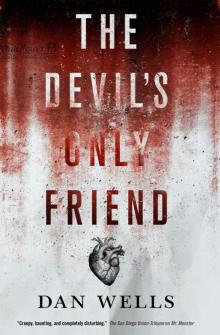 The Devil's Only Friend
The Devil's Only Friend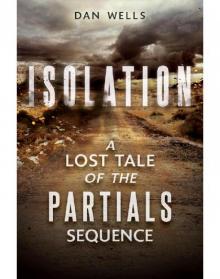 Isolation
Isolation I Don't Want to Kill You
I Don't Want to Kill You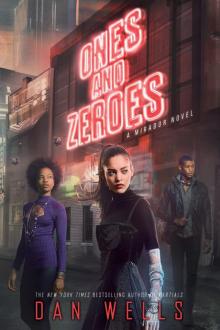 Ones and Zeroes
Ones and Zeroes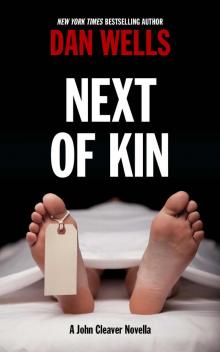 Next of Kin
Next of Kin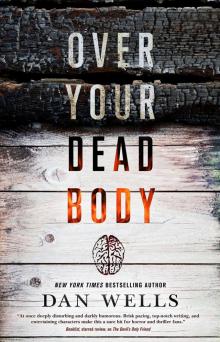 Over Your Dead Body
Over Your Dead Body Fragments
Fragments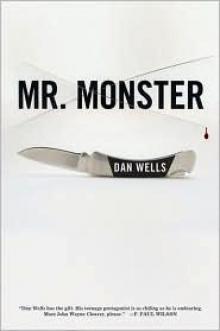 Mr. Monster
Mr. Monster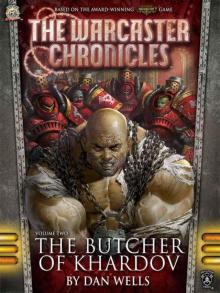 The Butcher of Khardov
The Butcher of Khardov I AM NO T A S E RI AL KI L L E R
I AM NO T A S E RI AL KI L L E R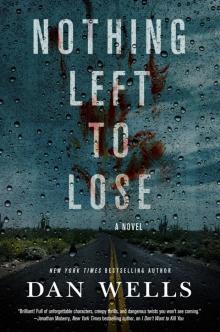 Nothing Left to Lose--A Novel
Nothing Left to Lose--A Novel Active Memory
Active Memory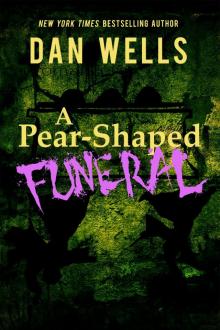 A Pear-Shaped Funeral
A Pear-Shaped Funeral I Am Not a Serial Killer
I Am Not a Serial Killer Bluescreen
Bluescreen Ruins
Ruins Zero G
Zero G The Hollow City
The Hollow City Extreme Makeover
Extreme Makeover Partials p-1
Partials p-1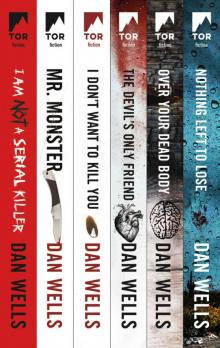 The Complete John Wayne Cleaver Series: I Am Not a Serial Killer, Mr. Monster, I Don't Want to Kill You, Devil's Only Friend, Over Your Dead Body, Nothing Left to Lose
The Complete John Wayne Cleaver Series: I Am Not a Serial Killer, Mr. Monster, I Don't Want to Kill You, Devil's Only Friend, Over Your Dead Body, Nothing Left to Lose